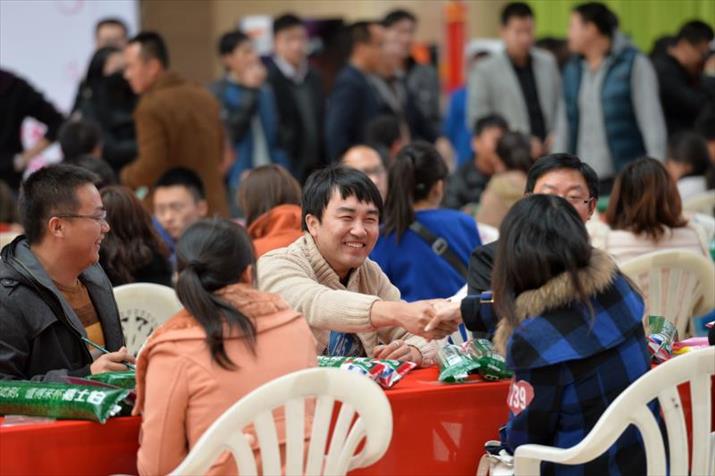|
||||||
|
||||||
| Home Nation World Business Opinion Lifestyle Multimedia Documents Special Reports Africa Travel |
|
||||||
|
||||||
| Home Nation World Business Opinion Lifestyle Multimedia Documents Special Reports Africa Travel |
| Nation |
| Last Woman Standing |
| As Chinese youth's attitude toward marriage is changing, being single is not a curse anymore |
| By Xia Yuanyuan | ChinAfrica VOL. 8 September 2016 |
 Single people's information displayed in a park (XINHUA)
"So, do you have a boyfriend?" Guo Yue heard this question countless times from parents and relatives during the Mid-Autumn Festival, a Chinese traditional holiday for family reunion. Although the 29-year-old young woman was looking forward to spending time home with her family, her holiday was nearly ruined by what she sees as an intrusion into her private life. A state-owned bank employee in Beijing, Guo earns a decent salary and is enjoying a successful career as a young professional. However, what Guo's parents are most concerned about is her marriage. They are afraid that if she does not get married soon, she will be "left behind." Guo's situation is nothing exceptional in China, especially in bigger cities. According to the Chinese traditional concept of family, if a woman does not get married before 30, she will be devalued and regarded as a "Sheng Nu," a derogatory expression which literally means "leftover woman." Generally, Sheng Nu refers to women in their late 20s or early 30s who are still single. Most often than now, they have a higher than average education level and income, and tend to focus on their career. According to statistics of The Straits Times, the number of "leftover women" in Beijing has exceeded 800,000. The "leftover women" phenomenon reflects Chinese youth's changing attitude towards marriage. In the past, it was widely held that marriage was one's life major event, the beginning of what many believed to be real happiness. However, this is not entirely the case anymore. According to an online survey of 50,000 individuals in 2016, conducted by Tecent, China's largest Internet provider, 36.8 percent of female respondents said marriage is not a rigid requirement for them anymore, and they could still lead a happy life without tying the knot.  Parents exchange children's information to select them a date (XINHUA)
High requirements This is not to say that "leftover women" would not get married given the opportunity. Most of them still wish to find the right man who would be a perfect match, both emotionally and financially. But compromising becomes more and more difficult as years go by. Guo stopped celebrating her birthday after she blew out her 25th birthday cake's candles. Every year, her birthday was like a ticking alarm clock reminding her that time is running out. "I feel like time is chasing me. Each year I get older, I become more stressed," Guo told ChinAfrica, "Gradually, I realized that most of my male friends of my age are already married. The men still single are much younger than me, so it is really difficult for me to find a suitable partner." For Guo, what matters most in marriage is love. She wants to find a man for whom she has genuine feelings. "Marriage must be based on true love. My husband should be my soul mate. This is a bit of a high requirement," she said. Shao Jie, a 32-year-old sales manager, is mostly concerned about her future spouse's financial situation. The young professional lives and works in Beijing, where she enjoys a much-higher-than-average salary. "Marriage is different from dating. Marriage depends on realistic conditions. If there is a large income gap between my husband and me, we won't have similar consumption habits. I won't accept a man in a worse financial situation than me," she told ChinAfrica, "If it comes to that, I'd prefer to remain single." Many culprits The Sheng Nu phenomenon is intrinsically linked to broader social changes in Chinese society. One of these is that women's average level of education is now higher than men. According to data from China's Ministry of Education, the number of female postgraduates exceeded that of male six years in a row from 2009 to 2014. This is a problem in a traditional society where men usually prefer a wife with lower academic qualifications. Financial status is also a critical factor. For those living in big cities, booming house prices have put a huge burden on those who just entered the workforce. According to Home Link, a real estate agency in Beijing, the average house price in Beijing in August 2016 has risen to $7,700 per square meter, the highest in the country. For Wang Junsheng, a psychological consultant at the Women's Federation in east China's Shandong Province, the changing job market is also a major culprit. As young people are under high pressure to find a job, they invest more time and energy in their education and less in their marriage. "At the end of their postgraduate or doctoral education, young people are nearly 30 years old. When they settle down with a stable job, they have already passed the best age for marriage," Wang said.  Blind dates for adults are becoming increasingly popular (XINHUA)
Alleviating consequences All in all, the decisions to get married or not, and when to get married, are matters of personal preference. But these questions do have an impact on social development. By the end of 2015, according to China's Ministry of Civil Affairs, the number of single young people has reached 20 million. With so many marriageable people remaining single, the next baby boom could be postponed indefinitely. This is not good news for China whose aging population is growing fast. The 2014 Population and Social Development Report released by the National Development and Reform Commission shows that China has entered the stage of low-level fertility. The Chinese Academy of Social Science pointed out that the birth rate in China kept dropping in 2015 to only 1.4, which is far lower than the population replacement level of 2.1. The current birth rate is dangerously near the internationally-recognized low fertility trap of 1.3. As late marriage and late childbirth may aggravate the aging population trend, the Chinese Government is taking steps to alleviate the threat. On December 27, 2015, Chinese lawmakers adopted an amended family planning law, a historic move which opened the door for couples to have two children. This is expected to relieve the aging pressure and re-balance the country's population structure. "I also wish to have a happy marriage and a lovely baby. But I need to wait...wait until the right person comes along," said Guo. "For now, I enjoy my life as a single, it's not bad." Copyedited by Francois Dube Comments to |
About Us | Contact Us | Advertise with Us | Subscribe
|
||
| Copyright Beijing Review All rights reserved 京ICP备08005356号 京公网安备110102005860号 |